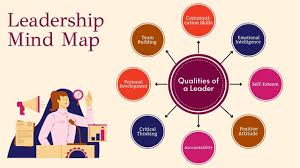Exploring Essential Leadership Qualities
Leadership is a multifaceted concept that encompasses a variety of qualities and characteristics. Effective leaders possess a unique blend of traits that enable them to inspire, motivate, and guide others towards a common goal. Let’s delve into some essential leadership qualities that are crucial for success:
Vision
A strong leader has a clear vision of the future and can articulate this vision to others. By setting ambitious yet achievable goals, leaders inspire their team members to strive for excellence and work towards a shared objective.
Communication
Effective communication is key to successful leadership. Leaders must be able to convey their ideas clearly, listen actively to feedback, and foster open dialogue within their team. Clear communication builds trust and ensures that everyone is on the same page.
Integrity
Integrity is the foundation of good leadership. Leaders who demonstrate honesty, transparency, and ethical behavior earn the respect and trust of their followers. Upholding high moral standards sets a positive example for others to follow.
Empathy
Empathy is the ability to understand and relate to the emotions and experiences of others. Leaders who show empathy create a supportive and inclusive environment where team members feel valued and understood. By considering the perspectives of others, leaders can make more informed decisions that benefit the entire team.
Resilience
In times of challenge or adversity, resilient leaders remain steadfast and composed. They adapt to changing circumstances, learn from setbacks, and inspire confidence in their team members. Resilient leaders demonstrate courage, perseverance, and determination in the face of obstacles.
Adaptability
The ability to adapt to new situations and embrace change is essential for effective leadership. Leaders who are flexible, innovative, and open-minded can navigate uncertainty with confidence and lead their team through transitions successfully.
In conclusion, leadership qualities such as vision, communication, integrity, empathy, resilience, and adaptability are fundamental for inspiring and guiding others towards success. By cultivating these traits within themselves, aspiring leaders can develop the skills necessary to make a positive impact in their organizations and communities.
Essential Leadership Qualities: A Comprehensive Guide to Key Traits
- What are 10 characteristics of good leaders?
- What are the 7 leadership qualities?
- What are the 14 qualities of great leaders?
- What are the 5 qualities of a good leader?
What are 10 characteristics of good leaders?
When exploring the question of what characteristics define a good leader, there are several key traits that consistently stand out. Ten characteristics of good leaders include strong communication skills, the ability to inspire and motivate others, integrity and honesty in their actions, a clear vision for the future, empathy towards team members, resilience in the face of challenges, adaptability to changing circumstances, decisiveness in decision-making, a commitment to continuous learning and improvement, and the capacity to delegate effectively. These qualities collectively contribute to effective leadership that fosters growth, collaboration, and success within teams and organizations.
What are the 7 leadership qualities?
When exploring the question of what are the 7 leadership qualities, it is important to consider a range of essential traits that define effective leaders. These qualities often include vision, communication, integrity, empathy, resilience, adaptability, and decisiveness. Leaders who possess a clear vision for the future can inspire others to work towards common goals. Effective communication skills enable leaders to convey their ideas clearly and foster open dialogue within their teams. Integrity and ethical behavior build trust and credibility among followers. Empathy allows leaders to understand and relate to the emotions of others, creating a supportive environment. Resilience helps leaders navigate challenges with composure and determination. Adaptability enables leaders to embrace change and lead through uncertainty. Decisiveness ensures that leaders can make timely and effective decisions for the benefit of their teams and organizations. These seven key qualities collectively contribute to strong leadership that drives success and inspires others to achieve their full potential.
What are the 14 qualities of great leaders?
Leadership qualities are essential for guiding teams and organizations towards success. When it comes to the 14 qualities of great leaders, there is a range of key attributes that stand out. These include vision, communication, integrity, empathy, resilience, adaptability, decisiveness, accountability, humility, confidence, creativity, delegation skills, strategic thinking, and the ability to inspire others. Great leaders possess a combination of these traits that enable them to inspire and motivate their team members while navigating challenges with grace and determination. By embodying these qualities, leaders can foster a positive work environment and drive their teams towards achieving common goals effectively.
What are the 5 qualities of a good leader?
When exploring the question of the five qualities of a good leader, several key traits consistently emerge as essential components of effective leadership. Vision, the ability to inspire and articulate a clear direction for the future, is crucial for guiding a team towards success. Strong communication skills enable leaders to convey their vision, listen actively, and foster open dialogue within their team. Integrity, demonstrated through honesty and ethical behavior, builds trust and credibility among followers. Empathy, the capacity to understand and relate to others’ emotions and perspectives, creates a supportive and inclusive environment. Lastly, resilience allows leaders to navigate challenges with composure, adaptability, and determination. These five qualities collectively form a solid foundation for impactful leadership that inspires and guides others towards shared goals.




sugar defender Integrating Sugar Protector into my everyday
program has been a game-changer for my general health.
As a person who currently prioritizes healthy and balanced consuming, this supplement has provided
an included increase of security. in my energy degrees, and my desire for unhealthy
snacks so simple and easy can have such an extensive effect on my daily life.
sugar defender reviews
Thank you for sharing your positive experience with Sugar Defender. It’s great to hear that integrating this supplement into your routine has had such a positive impact on your overall health and well-being. Consistency in prioritizing healthy choices can indeed lead to significant improvements in energy levels and cravings. Your testimonial highlights the importance of making conscious decisions for our health. If you have any insights on how these qualities relate to leadership, feel free to share them as well.
Having read this I thought it was very informative.
I appreciate you finding the time and effort to put this informative article
together. I once again find myself personally spending way too much time both reading and leaving comments.
But so what, it was still worthwhile!
Thank you for your positive feedback on our article about leadership qualities. We are glad to hear that you found the information informative and worthwhile. We appreciate your time and effort in reading and engaging with the content. Your support motivates us to continue creating valuable resources for our readers. If you have any further thoughts or questions, feel free to share them with us. Thank you again for your kind words!
Your method of explaining all in this paragraph is actually good, all
be able to effortlessly understand it, Thanks a
lot.
Thank you for your positive feedback! We’re glad to hear that you found the explanation of leadership qualities in the article to be clear and helpful. If you have any further questions or need more information, feel free to reach out. Leadership is indeed a multifaceted concept, and understanding its essential qualities is key to inspiring and guiding others towards success.
Very good article. I’m experiencing some of these issues as well..
Thank you for your feedback! It’s great to hear that you found the article on leadership qualities helpful. Remember, recognizing and addressing common challenges is a key part of developing strong leadership skills. Keep exploring these qualities to enhance your own leadership abilities.